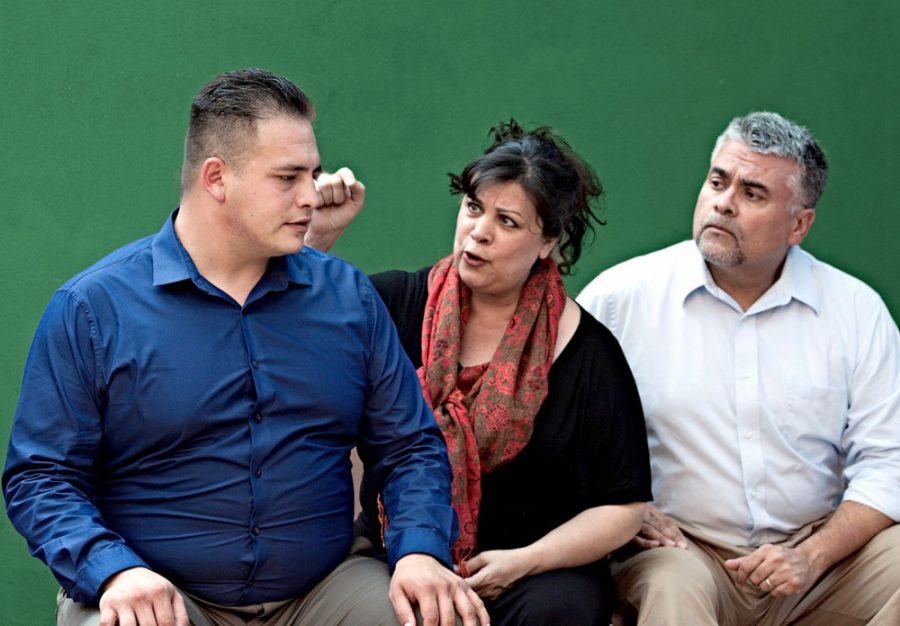Sometimes it takes a tragedy to uncover some humanity. This is a reoccurring pattern seen in the new play “They Call Me a Hero” at Borderlands Theater.
Circulating around the events of Jan. 8, 2011, which left six Tucson residents dead and another 13 wounded in a Safeway parking lot, the play focuses on the events that led 20-year-old Daniel Hernandez to take action in saving former Rep. Gabrielle Giffords after she suffered a gunshot wound to the head. Hernandez, a UA almnus, had been working as an intern in Giffords’ district office at the time of the shooting.
Based closely on Hernandez’s 2013 memoir, “They Call Me a Hero: A Memoir of My Youth,” playwright Guillermo Reyes, a professor at Arizona State University, has adapted the book into a fast-paced narrative consisting of various vignettes that stage specific milestones of Hernandez’s upbringing in Tucson.
As a writer who is more prone to comedy, Reyes said he had to adopt a different approach when he first began writing the play just over a year ago. Studying the Pima County Sheriff’s report from the day of the shooting and YouTube videos of assassin Jared Lee Loughner, Reyes was able to reconstruct the real-life trauma for a play he categorizes as a “docu-drama.”
“It’s a cathartic experience for people who lived through the event,” Reyes said.
The play starts with a reenactment of the events that happened on Jan. 8, 2011, then reverses through a series of flashbacks that slowly put the pieces together of how and why Hernandez responded the way he did on that fateful day.
Depicting intimate moments with Hernandez and his Mexican-American family, as well as revealing Hernandez’s training in nursing school, the story is meant to unravel the life moments that played a role in how he was able to help save Giffords’ life.
“When those skills were needed, they were there,” said Luke Salcido, the actor portraying Hernandez in “They Call Me a Hero.” Salcido described his character as a not-so-typical type of hero: a Latino, homosexual college student. Salcido said he thinks this characterization of heroism will be new to audiences.
The issue of Hernandez’s sexual identity is not portrayed as a stigma, according to director Barclay Goldsmith. The scene when Hernandez comes out to his parents is meant to be encouraging, Smith said, and his parents’ unquestionable acceptance alludes to a significant, character-building moment in Hernandez’s life.
“[The play] teaches us to respect the blocks that build a community,” said Goldsmith, who has been with Borderlands Theater since its opening in 1986.
Goldsmith said there was some difficulty directing a seven-member ensemble to portray the 20 different characters featured throughout “They Call Me a Hero.” For instance, the actress playing Giffords in one scene must transition into playing the mother of Loughner in the next. Goldsmith even had the actor playing Loughner meet with a psychiatrist, so he could get a better understanding of the character’s cognitive complexities.
According to Reyes, his play is not meant to sway the audience into thinking about any of the issues related to the event, such as gun control.
“The issues behind it will reveal themselves,” Reyes said. “We did not want to burden it with politics.”
After the play premieres at Borderlands Theater, Reyes said that he plans to make some revisions before sending the play off to inquiries he’s been getting from New York City and Los Angeles. Reyes said the play’s universal message of hope will find an audience outside of Tucson.
Though the residents of Tucson, who still remember the tragic event of Jan. 8, 2011, may find this play hard to digest, some may also find closure in seeing it artistically reinterpreted.
“Sometimes, a community needs to give tribute to the past,” Goldsmith said, “and sometimes, a community just needs to grieve.”
_______________
Follow Kevin C. Reagan on Twitter @KevinReaganUA









